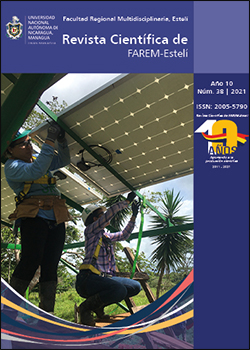Morphometric parameters of the hydrological unit 69-95259905 Masaya, Nicaragua; as a first stage in the hydrological characterization
DOI:
https://doi.org/10.5377/farem.v0i38.11954Keywords:
Watershed, morphometric parameters, hydrographic characterizationAbstract
The morphometric characterization of a watershed is considered one of the first stages prior to a surface and subsurface hydrological study. The present study was carried out in the hydrological unit 69-95259905, which belongs administratively to the municipality of Masaya, Nicaragua. The geomorphological indices used in this work are based on a morphometric analysis: parameters of size-shape, relief and fluvial intensity; which allow through mathematical approximations to know the morphodynamics of the basin and its influence on the hydrological behavior. The calculation of morphometric parameters served to know the physiography of the basin, which are important to analyze the hydrological behavior, related to erosion, sedimentation and water recharge and discharge behavior, in turn to relate the natural variables and their impact on the capacity of the basin to store water, these elements are of great importance in the process of hydrographic characterization of a basin, these works have relevance, since they are the first approaches to recognize a territory and according to its natural resources understand the dynamics of water resources in the territory. (Robleto, 2014)
Downloads
References
Gaspari, F. (2012). Caracterización morfométrica de la cuenca alta del río Sauce Grande, Buenos Aires, Argentina.
Gonzales , A. (2004). Análsis morfometrico de la cuenca y de la red de drenaje del Río Zadorra y sus afluentes a la peligrosidad de crecidas. Obtenido de https://www.researchgate.net/publication/28078894_Analisis_morfometrico_de_la_cuenca_y_de_la_red_de_drenaje_del_rio_Zadorra_y_sus_afluentes_aplicado_a_la_peligrosidad_de_crecidas
Gregoriy, K., & Walling, D. (1973). Drainage basin form and processes A geomorphological approach. London.
Horton. (1945). Erosional Development of Streams and their Drainage Basins, Bulletin of the Geological Society of America.
Horton, R. (1945). Erosional development of streams and their drainage basins hrydrophysical appoach to quantitative morphology.
Huaman, G. (2015). Analisis Morfometrico e Hidrologico de la subcuenca hidrografica arasá, departamento de Cusco. Perú. Perú.
INETER, MARENA, & UNI. (2014). Delimitaciòn de cuenca bajo la metodologìa Pfafstetter. Managua.
Jardí, M. (1985). Forma de una cuenca de drenaje. Analisis de las variables Morfometricas que nos la definen. Revista de Geografia, volumen XIX., 41-68.
Juarez, M. (2016). Delimitación de la cuenca y unidades hidrograficas del arroyo La encantada Saltillo Coahuila mediante el método Pfafstetter. Mexico.
Robleto, J. (2014). Hidrología y disponibilidad Hídrica. Primer plan de Gestion Integrada de los Recursos Hídricos de la Autoridad Nacional del Agua, 12-13.
Senciales, J. (1999). El análisis morfológico de las cuencas fluviales aplicado al estudio hidrográfico. Obtenido de ResearchGate:
Senciales, J. M. (1998). El anàlsis morfològico de las cuencas fluviales aplicado al estudio hidrogràfico. Obtenido de https://dialnet.unirioja.es/descarga/articulo/109746.pdf
Strahler. (1957). Revisión y perfección el esquema de Horton dando lugar al esquema de orfenación o de clasificación de cuenca. España.
Published
Issue
Section
License
Copyright (c) 2021 Revista Científica de FAREM-Esteli

This work is licensed under a Creative Commons Attribution-NonCommercial-ShareAlike 4.0 International License.



